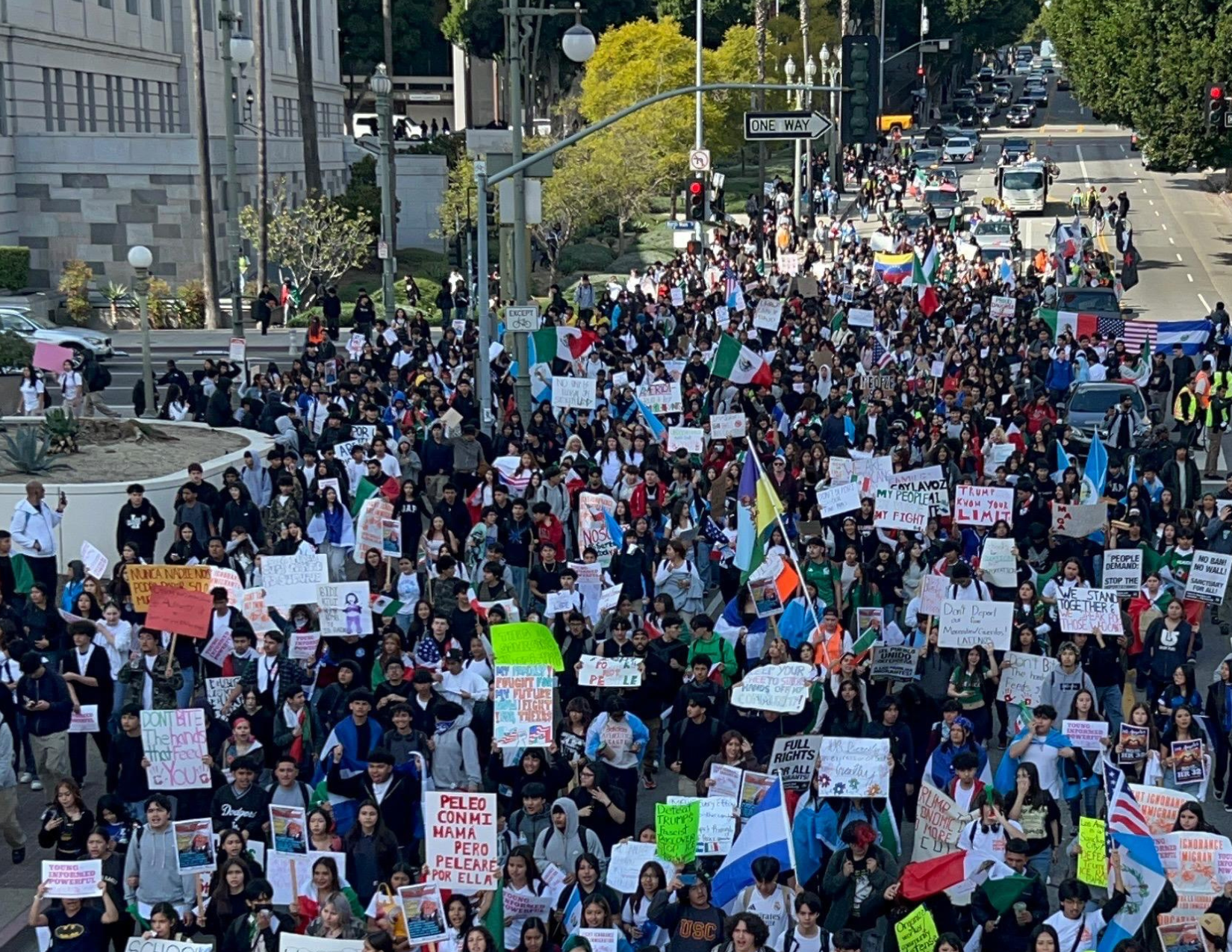When Auto Workers President Shawn Fain told the world last fall that he was advocating a general strike on May Day 2028, socialist hearts leapt.
Fain’s call was not just a tweet. On May Day this year, he reiterated, in In These Times, “We wanted to ensure our contracts expired at midnight on April 30, 2028, not as a symbolic gesture, but as a rallying cry. We’ve asked other unions to join us in setting their contract expiration dates to May Day 2028 in hopes the labor movement can collectively aspire to building the power needed to change the world.”
Leaders of the Service Employees (SEIU), with 2 million members in health care, janitorial, and public service, showed immediate interest. At the April Labor Notes Conference, a workshop on “Aligning Our Contracts” for that date was packed.
Of course, most American workers are not union members, making it much less likely they’d be able to strike (though their right to do so is legally protected). Still, if some biggish portion of the 14.4 million U.S. union members went out together, it would be a symbolic show of power unlike any we’ve seen in this country.
We’d do well to think about the obstacles too.
One is the difficulty of getting many unions on board, because of the fragmentation of the labor movement, the siloes and leaders’ egos. The president of one union doesn’t see himself as needing a leader from a different union. The established leaders don’t know Fain well and they have reasons to distrust him — his origins in dissent, his radical rhetoric, and even his widely publicized winning strike against the Big 3 automakers last fall, an achievement others can’t point to. In 1997 the Teamsters’ strike at UPS was a resounding national success but it did not lead to other unions’ doing likewise.
In our Balkanized system it’s hard for successes to spread from union to union. A possible exception is the idea of reform from below, as reformers in other unions (Food and Commercial Workers, Massachusetts Teachers, Chicago Teachers, Professional and Technical Engineers, Machinists, Theatrical Stage Employees) have taken heart from the example of Teamsters for a Democratic Union and now Unite All Workers for Democracy, the movement in the Auto Workers, and begun their own caucuses. That direct learning from each other is part of what Labor Notes promotes. But with reformers decidedly not in control of many unions, the power of a good example of how to lead is… less powerful.
A second caution is the fact that it might make less sense to strike on May 1 with a relatively random set of other unionists than to figure out how to ally with those whose interests are directly connected to yours. Do teachers want to line up their contracts for seven weeks before the end of the school year, in order to ally with auto workers, or is September a better time for school workers? Do bus drivers want to line up with other public employees in their city, or with GM workers?
Most unionized workers are not in national contracts. Would it make more sense for Teamsters at the national company US Foods to try to bring their dozen local contracts to a common date, even if that’s not May Day? Of course, if that effort is real, they might as well make it May Day.
The UAW will presumably mount a real, open-ended strike at the Big 3 automakers, or a subset, as it did in 2023 (perhaps with Volkswagen workers now on board). But it’s easy to imagine the “general strike” devolving into something more symbolic. Most participants would not have contract expirations and would be picketing on their lunch hour. Since May 1 is a Monday, maybe there’d be a large demonstration in DC on April 29, calling for Medicare for All or to divert war spending to human needs. That would be a beautiful thing, but not a general strike.
For Fain simply to raise the idea of a general strike is positive, of course. A union leader who genuinely believes in class struggle can make big ideas something closer to common coin. During the Big 3 contract fight last year, Fain resurrected the old socialist call for 32 hours’ work for 40 hours’ pay (well, it was actually 30 back in the day). No member thought this was a real demand on the Big 3 (one Ford worker scoffed, “That’s for Europe”), but it was a bit of a consciousness-raiser. It set up the possibility that brutal overtime schedules are not inevitable, that workers deserve lives. (It also helped lead to members’ disappointment when the new contracts did not address “work-life balance.”)
Fain, however, is clear he doesn’t want a symbolic May Day. He wrote, “There’s been talk about a ‘general strike’ for as long as I’ve been alive. But that’s all it has been: talk.
“If we are serious about building enough collective power to win universal healthcare and the right to retire with dignity, then we need to spend the next four years getting prepared.
“A general strike isn’t going to happen on a whim. It’s not going to happen over social media. A successful general strike is going to take time, mass coordination, and a whole lot of work by the labor movement.”
Unionists would do well to consider what is possible for May Day 2028 and what the real challenges for a general strike look like. With Trump in the White House, we may need to organize a mass mobilization much sooner.




